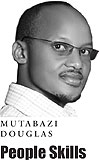We’ve heard of leadership styles and communication styles.But if you are like me, you have probably never given much thought to listening. What is your listening style? Most self-assessments do not measure how we listen. Yet, we all recognize how important listening is to communication.


We’ve heard of leadership styles and communication styles.But if you are like me, you have probably never given much thought to listening. What is your listening style? Most self-assessments do not measure how we listen. Yet, we all recognize how important listening is to communication.
Developing strong listening skills is a key element in building collaborative, professional and long-lasting personal relationships.
Listening is an integral part of the whole communication cycle.Listen to the experienced guru’s out there and they will tell you that listening ranks much higher than actual discourse ability.
To get a feel for what this might mean, imagine yourself as the speaker - how do you feel and respond when someone doesn’t pay attention to you as you speak to them?
And how is that different when the listener puts their whole attention on what you are saying? We want it so people will listen to us; they will do it if we will listen to them.
For people to communicate well with one another, they need to not only understand their own style preferences, but the style preferences of the other person, if possible.
So, how can we determine our listening style? Just like the best way to learn about your leadership (yes every one is a leader in one way or another) or communication style is by observation, the same is true with listening.
Ever noticed that if you tend to communicate boldly, you’ll tend to be a bold listener? Hints about the way you listen exist within your personality. Here are some examples. See if you see yourself described in these four styles of listening:
Compassionate Listener:This person stops whatever he is doing, turns, faces the communicator and gives that person complete attention.
The Compassionate Listener watches both verbal and nonverbal messages to understand what the speaker is saying beyond the words.
This person rarely turns away from a speaker and rarely talks about himself. If you’ve experienced a Compassionate Listener, you know that you walk away from the experience feeling heard, respected and energized.
Too busy to listen Listener: This person never stops doing things. Their hands busily scurry across the computer key board, straighten up the house, fiddle with the phone.
The Too Busy to Listen Listener is in a state of constant action. They tell others they cannot sit still. Whenever someone approaches them with something to say, this person thinks, "How long will this take?”
Sometimes they ask the other person to come back when things slow down (which is when?). They rarely give the other person full attention because they are multi-tasking. Often messages which are shared get confused in the translation.
The blank Listener: Here’s a listener who hears words and not meaning. They see the non-verbals but do not connect with them.
They spends time "listening,” but feel relieved when the person finishes whatever they came to say. They tend to point out discrepancies in the conversation Or they try to laser the conversation, "What exactly did you come to talk to me about?”
The it’s me listener: This person thinks himself a great listener. They love being with other people so they believe they are good at connecting.
The problem with their listening is they get in their own way. The its Me Listener wants to tell the listener all about themselves and their experiences. Whenever the conversation shifts, the It’s Me Listener changes the subject to whatever happened to him.
Usually the conversation ends with each person wondering what the point of the initial discussion was in the first place.
Think about yourself. Next time someone says, "Have you got a minute?” pay attention to your own listening style. You may surprise yourself!
The author is a regular contributor


